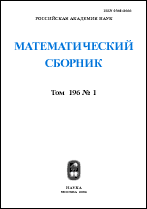|
This article is cited in 2 scientific papers (total in 2 papers)
On sets of convergence and divergence of multiple orthogonal series
M. I. Dyachenkoa, K. S. Kazarianb
a M. V. Lomonosov Moscow State University
b Universidad Autonoma de Madrid
Abstract:
Multiple Fourier series with respect to uniformly bounded orthonormal systems (ONSs) are studied. The following results are obtained.
\medskip
Theorem 1. \textit{Let $\Phi=\{\varphi_n(x)\}_{n=1}^\infty$ be a complete orthonormal system on $[0,1]$ that is uniformly bounded by $M$ on this interval, assume that
$m\geqslant2$, and let $\Phi(m)=\{\varphi_{\mathbf n}(\mathbf x)\}_{\mathbf n
\in\mathbb N^m}$, where $\varphi_{\mathbf n}(\mathbf n)
=\varphi_{n_1}(x_1)\dotsb\varphi_{n_m}(x_m)$. Then there exists a function
$f(\mathbf x)\in L([0,1]^m)$ cubically diverges on some measurable subset
$\mathscr H$ of $[0,1]^m$ with $\mu_m(\mathscr H)\geqslant 1-(1-1/M^2)^m$.
}
\medskip
Theorem 3. For $M>1$ and an integer
$m\geqslant 2$ let $E$ be an arbitrary measurable subset of
$[0,1]$ such that $\mu(E)=1-1/M^2$.
Then there exists a complete orthonormal system $\Phi$
on $[0,1]$ uniformly bounded by $M$ there such that the multiple Fourier series of each function $f(\mathbf x)\in L([0,1]^m)$ with respect to the product system $\Phi(m)$ cubically converges to $f(\mathbf x)$ a.e. on $E^m$.
\medskip
Definitive results in this direction are established also for incomplete uniformly bounded ONSs.
Received: 26.02.2002
Citation:
M. I. Dyachenko, K. S. Kazarian, “On sets of convergence and divergence of multiple orthogonal series”, Sb. Math., 193:9 (2002), 1281–1301
Linking options:
https://www.mathnet.ru/eng/sm678https://doi.org/10.1070/SM2002v193n09ABEH000678 https://www.mathnet.ru/eng/sm/v193/i9/p41
|


|




 Contact us:
Contact us: Terms of Use
Terms of Use
 Registration to the website
Registration to the website Logotypes
Logotypes








 Citation in format
Citation in format 
